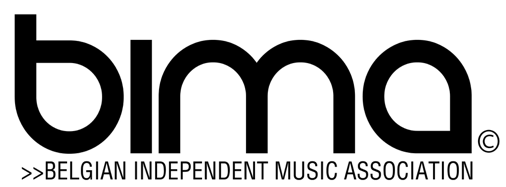Music Move Europe Awards // Invitation to recommend Artist
RE_BIMAbe1065
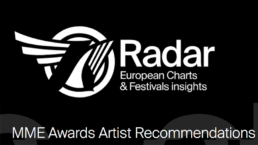
Music Moves Europe Awards 2025: Invitation to Recommend Artist
#MembersOnly
BIMA is on board as one of the professional recommenders for MME Awards 2025!
MMEA are doing their best to map out all the emerging and trending acts from across Europe.
So we need your recommandation (Max one per member)
The two main qualifiers for the Music Moves Europe Awards that you should think about when recommending artists are
- Active outside their home country; we want to see activity across Europe or even worldwide. This applies to live shows, streaming or airplay.
- We are searching for acts that are still emerging/didn’t break yet; the idea is that MME Awards give the 15 nominees every year a push in their career.
The nominated artists will be presented in the autumn. The winners will be selected by the jury and revealed at the ESNS festival in January 2025. 7 winners will receive 10.000,- EUR each to take their career to the next stage.
Please send us your recommendation before Friday, May 31st !
Send one artist name + social links to remi@bima.be
Detailed Recommendation Criteria:
- We ask you to recommend artist from Belgium 🙂
- You can only recommend artists whose debut EP/album was not released more than 36 months ago and/or in the past 60 months did not release more than 5 singles in a collection larger than 2 songs.
- The artist did not participate in the Eurovision song contest.
Strategic Primer : APPLE MUSIC
RE_BIMAbe1065
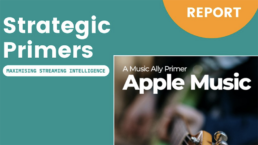
How can you maximise your visibility and revenue on Apple Music?
Following up on the release of this third Primer, A
Q&A session on Thursday 6 June at 4.30pm CET.
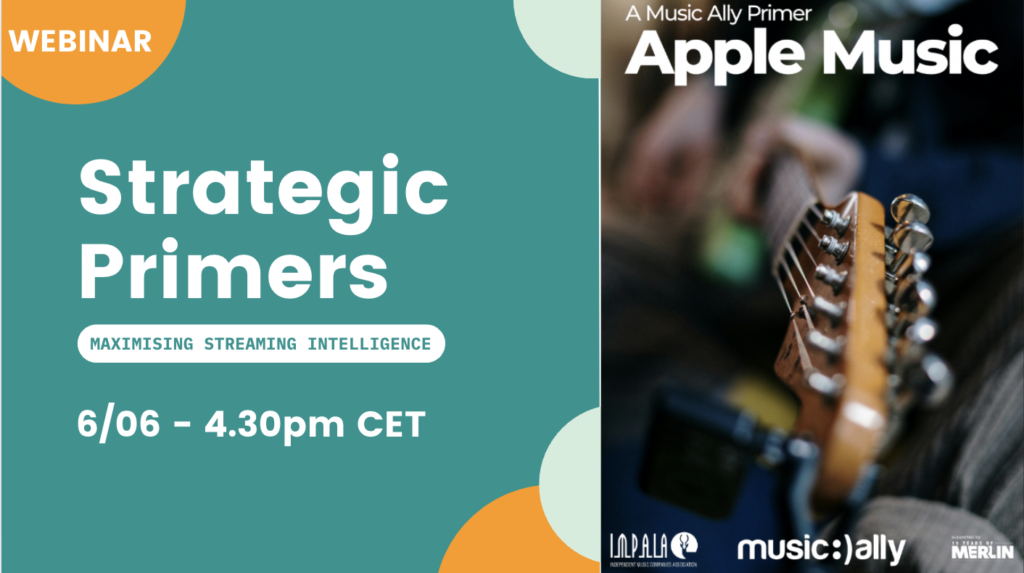
L’objectif du projet est de fournir aux labels indépendants des informations complètes sur la manière de maximiser les opportunités de streaming pour leurs artistes et de s’assurer qu’ils bénéficient d’une bonne visibilité sur les plateformes de streaming.
Deux autres Strategic Primer sont déjà disponible consacrés à Spotify et Amazon Music.
A télécharger ici. (accès réservés aux membres BIMA)
Pas encore d’accès, contactez remi(at)bima.be
One Voice For European Music
RE_BIMAbe1065

The ONE VOICE FOR EUROPEAN MUSIC platform, a pan-european sectoral initiative bringing together a wide range of music organisations (labels, concert venues, collecting societies, export offices, publishers, instrument manufacturers etc.), made public an 8-page POLICY DOCUMENT encouraging the European Commission and the Council of the EU to substantially develop the support and policy instruments available for the music sector at EU level.
The document was drafted by a representative group of 22 Belgian organisations under the leadership of Wallonie Bruxelles Musiques and VI.BE (the main public associations supporting the music sector in the country) and delivered to policymakers in the context of the Belgian Presidency of the EU. 19 EU-level federations, associations and trade bodies have brought their support to the policy paper prepared at Belgian level, for a total of 41 signatory bodies.
Among other key points listed in the document, the ONE VOICE FOR EUROPEAN MUSIC platform asks the EU institutions to create a “european music observatory”, to develop a “european music export strategy”, and to substantially increase the level of financial support for music projects across the EU.
The policy paper also calls on the EU to consider the needs of the music sector in implementing the newly agreed AI Act, to build solutions for grassroots venues and festivals, to design balanced solutions regarding the remuneration of authors and creators and help accelerate the sector’s green transition.
The recommendations developed by the coalition largely echo two recent resolutions voted by the European Parliament, on the topics of music streaming and working conditions of artists.
Corinne Sadki, President of European Music Exports Exchange (member of ONE VOICE FOR EUROPEAN MUSIC), said : “We believe that these recommendations, supported by a very wide consensus in the european music sector, are balanced, reasonable and easily actionable. They can help unlock the potential of european music on the world stage and help create a much-needed soft-power momentum for the EU”.
The ONE VOICE FOR EUROPEAN MUSIC initiative was launched by the French Centre National de la Musique in 2021 to find common policy positions within the european music sector. During each rotating presidency of the EU, the initiative is led by a representative panel of national organisations tasked with creating the groundwork for a set of recommendations which can be endorsed at EU level. Its first policy report was delivered during the French presidency of the EU.
The policy paper urges the European institutions to “claim ownership of these recommendations and make them a reality”. The document was released on May 9th to celebrate Europe Day.
Illegal Platform Warning
RE_BIMAbe1065

As some of you know, a platform called Awtar Melody has been reported to Merlin as seemingly illegal, despite apparently claiming authentic credential.
Some members confirmed that their catalogue is featured on the platform, despite not being familiar with it.If you’re in this case please contact us.
They are investigating it now and will let Merlin know what further actions they are proposing to take. Merlin will keep us updated.
In the meantime, if you have any information, please don’t hesitate to let us know.
Global Independent Values
RE_BIMAbe1065
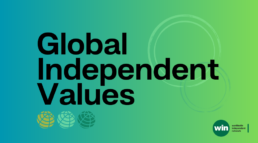
Ten core principles representing the collective position of the independent music sector
The Worldwide Independent Network (WIN), the organization that connects and develops the global independent music community, proudly announces a renewed set of values as part of its ongoing work to promote the collective position of the sector in today’s evolving music landscape.
From growing the value of music to nurturing artist relationships, addressing market consolidation, and embracing new technologies, the Global Independent Values make a strong statement about what unites the independent music community. Collectively, our sector advocates best practices and creates new opportunities, driven by a shared purpose to advance the interests of independents and foster a fair and vibrant music ecosystem for all.
Global Independent Values
1. We, the independents, work to grow the value of music and the music business. Independent music businesses should have full market access and the best terms available. An independent copyright should be valued and remunerated at the highest level. We work to ensure that all businesses in our sector are best equipped to maximize the value of their rights.
2. We support creators’ freedom to decide how their music is used and their right to earn a living from their work, which should be respected as a basic human right. We encourage artists and independent music businesses to speak out directly against any uses of music that stifle that freedom. We expect all uses of music to be subject to authorization and fairly negotiated licensing terms.
3. We support independent music businesses who treat the artists they work with as key partners and engage with them on fair commercial terms, noting that those businesses are investors who deserve a fair financial return alongside artists. We welcome choice and the variety of business models made available to artists by independent music businesses.
4. We promote transparency and fairness across the music market, including the digital landscape. All parties are entitled to clarity on commercial terms. We work to promote responsible and fair business models that provide a dynamic and compelling future for artists, businesses and fans.
5. We support initiatives which confront market abuse and oppose over-consolidation in any part of the broader music ecosystem where it reduces market access and consumer choice. We work to promote market access and foster collective responses by independents to potentially anti-competitive conduct.
6. We recognize that all independent music businesses contribute to local culture, diversity, jobs and export opportunities, and multiply the economic success of related industries. We call on governments to promote and support the independent music sector. Access to finance and to local and international markets, tax incentives, and policies which encourage investment in music should be prioritized.
7. We champion the full adoption and protection of the rights conferred on the owners of sound recordings by international treaties in all territories. We promote initiatives to increase the transparency, democracy and efficiency of collecting societies, so that revenues are allocated and distributed accurately to their rightful owners.
8. We actively encourage and promote innovation and new commercial opportunities for music. We support the development of new, legitimate technologies, business structures and partnerships, and advocate for best practices within our industry.
9. We promote equity, diversity, inclusion and sustainability in the music sector. We encourage best practices, local developments and projects regarding diversity and inclusion as well as those which promote individual and collective action to address the climate and environmental emergency.
10. The independents work together to build a strong, ethical and united ecosystem, fostering knowledge-sharing, international exchange and cooperation, and creating opportunities for all independent music businesses and their representative bodies around the world.
The Global Independent Values are available in English, Spanish, French, Japanese, Korean and Portuguese.
ARTISTS AND LABELS URGE EC TO “GET ITS HOUSE IN ORDER”
RE_BIMAbe1065
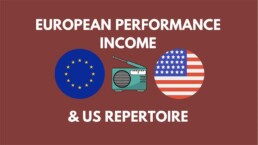
With only two months to go before the European elections, artists and labels from across Europe are joining forces again and calling on the European Commission to come forward with a clear proposal to address the consequences of the EU “RAAP” case regarding terrestrial broadcast and public performance rights.
In the RAAP judgment of 2020, the Court of Justice of the EU indicated that the Directive dealing with the public performance rights of music performers and producers could be amended to confirm the longstanding principle of reciprocity deriving from the international copyright treaties.
This approach would maintain EU trade pressure and stop the annual transfer of 125m Euros away from the European music sector to the USA and other countries which do not provide these basic protections in their national copyright law. This can be done in a proportionate way with a harmonised framework which also accommodates countries that currently apply another system.
The European Commission has said that it recognised the problem and the music sector, EU governments and members of the European parliament have on many occasions flagged the need to address this urgently. A clear sign is needed that this is going to happen before the end of the current European Commission’s mandate, almost four years after the ruling has been delivered.
Helen Smith, Executive Chair of IMPALA (European association of independent music companies), said: “With the end of the current EU legislature now just weeks away, we want to remind decision makers to “get their house in order”. Responsibility for this lies with the current commission, not the next. If we can get results on AI, we can do it on RAAP. A proposal is needed now to restore legal certainty and prevent European artists and producers losing more than €1bn over the next decade to the USA, which has chosen not to protect these rights”.
MEP Tomasz Frankowski, European Parliament, commented: “The European Commission is responsible for addressing this situation within a reasonable timeframe. Together with several of my colleagues, we have been keeping a close eye on the process and have asked the Commission on several occasions how they planned to address this. Concerns have been acknowledged but now is the time for action. We owe this to our artists and music SMEs”.
Will Maas, Chairman Ntb/Kunstenbond (Dutch musicians’ union) continued: “If nothing is done soon, revenues going to European artists will continue to drop significantly, to the point where many will no longer be able to make a living from their music. Action is needed now, this is a no-brainer, doing nothing is like shooting ourselves in the foot when the EU should be doing everything it can to guarantee its sovereignty and safeguard cultural diversity”.
Helen Smith concluded: “There is a growing body of legal opinions coming from different parts of Europe confirming that the legislation can be clarified in a proportionate way that would promote harmonisation while taking into account the diversity of national approaches, as with other points of copyright. European artists and producers are asking for this, European governments are asking for this, the European Parliament is asking for this, now it is time for the European Commission to come forward with a balanced solution. Alongside this, we also ask the EC to prioritise trade pressure on the USA to introduce these basic protections in their domestic legislation”.
Today’s call from European artists and independent labels comes ahead of two important milestones on the EU’s copyright agenda: the next meeting of the Council of the EU’s working party on copyright, taking place on 10th April in Brussels, where the RAAP case will be discussed, and the next meeting of EU Culture Ministers on 13th May. Our call also coincides with the Belgian EU Presidency Copyright Conference, taking place 8-9th April in Namur, focused on the remuneration of authors and performers in the creative industries.
Signatories
- Adami – French collective management organisation for performers’ rights
- Creo – Norwegian union for arts and culture
- Dansk Artist Forbund – Danish Artist Union
- Dansk Musiker Forbund – Danish Musicians Union
- De Muziekgilde – Association of musicians and producing DJ’s residing in the Dutch speaking part of Belgium
- FACIR – Belgian Federation of authors, composers and performers
- IMPALA – European association of independent music companies
- Musikerförbundet – Swedish Musicians’ Union
- Ntb/Kunstenbond – Dutch Musicians’ Union
- PlayRight – Belgian collective management society of neighbouring rights for performing artists
- SAMI – Swedish Artists’ and Musicians’ Interest Organisation
- SYMF – Swedish Union of Professional Musicians
- unisono – German Federation of Musicians
BIMA Artists in "100 Independent Artists to Watch" selection
RE_BIMAbe1065
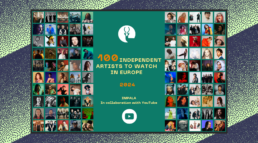
Pour la troisième année consécutive, IMPALA revient avec sa très attendue édition des « 100 artists to watch 2024 » en collaboration avec YouTube. Nous sommes heureux de retrouver 4 artistes de nos labels membres dans cette sélection dynamique qui met en valeur les talents émergents issus du secteur européen de la musique indépendante.
Cette initiative paneuropéenne vise à mettre en lumière des artistes d’origines culturelles et de genres différents, en mettant l’accent sur l’inclusion et leur représentation au-delà des frontières. Cette sélection ne met pas seulement en lumière les talents émergents, mais reconnaît également les artistes et les labels indépendants qui continuent à repousser les limites et la standardisation. Les membres sont encouragés à nommer des artistes qu’ils estiment être ceux à suivre actuellement, sur la base de facteurs tels que la diversité, l’innovation ou le succès commercial. Grâce à ce programme avec YouTube, l’IMPALA cherche à favoriser un écosystème musical plus inclusif et dynamique, où tous les artistes peuvent prospérer et être célébrés.
Cette année, la sélection s’est enrichie d’artistes originaires de 31 pays, couvrant une grande variété de genres, du jazz au hip-hop, du folk à l’électronique, de la pop au punk. Grâce à la curiosité de nos labels indépendants, découvrez pléthore de nouveaux sons.
Reserve your .music domain
RE_BIMAbe1065

As you may remember, a few years ago, IMPALA and other music associations supported the idea of a community led approach for the registration of .MUSIC domain names. The consortium backed by the music industry to run these community names has now started to take registrations.
You can directly contact the team at my.MUSIC to reserve and protect your names during an initial free Priority Period, which ends on May 24, 2024. This means that the domain registration is free for the first year, after which the renewal price will be set by the interested member and my.MUSIC.
For interested BIMA members, Email my.MUSIC at reserve@my.music with your list of names and mention IMPALA.
You can click here for more details about the offer. Here is a video link that explains the value of verified .MUSIC domain name, as well as a deck attached for an overview of .MUSIC.
Of course, we would advise to make sure you are happy with the terms before commiting.
The team at my.MUSIC will follow up with BIMA directly to help with any clarification needs and answer any questions.
Carbon Calculator 2024
RE_BIMAbe1065
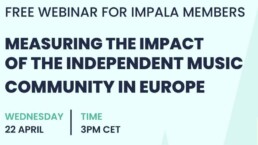
IMPALA & Julie’s Bicycle are organising a free carbon calculator webinar for IMPALA members
April 22, 3pm CET
Register on krogozar@impalamusic.org
BIMA Members have until June 3rd to complete their footprint & be in the 2nd carbon calculator report
Independent label and distributor survey
RE_BIMAbe1065
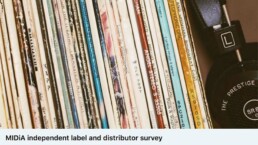
We invite members & all belgian independent labels & distributors to participate to this survey to be able to share data on the contribution of the belgian independent sector to the global recorded music market.
Please drop an email to info@bima.be when its done.
About Midia :
MIDiA is fielding its annual independent label and distributor survey. This is the chance for the independent sector to have its voice heard. Given all of the changes that are taking place in the streaming economy, there has perhaps never been a more important time for this. In the survey, we ask about topics such as two-tier licensing, artist cut through, AI, catalogue and marketing.
All participants will get a copy of the final report so you can get a definitive view of how the wider independent marketplace is performing and how it is responding to today’s market challenges and opportunities.
Crucially, all of the data is treated as strictly confidential. We never share respondent level data with anyone and we only use the respondent level data to create the aggregate market figures. This means your company-level responses are not seen by anyone else.
MIDiA has fielded this survey for years now and have been trusted with their data by many hundreds of labels and distributors.
